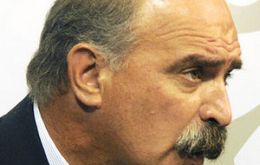MercoPress. South Atlantic News Agency
Tag: Uruguay economy
-
Saturday, February 23rd 2013 - 06:34 UTC
“Uruguayan government in deep crisis”, admits Mujica with a split cabinet and two economic teams

“The Uruguayan government is in deep crisis” admitted President Jose Mujica following an open clash between ministers that called for an urgent meeting of the cabinet and half way had to be adjourned on fears that recriminations could get out of control. A recess was ordered but the squabbling through the press continued and the exposed deep rift remains more than a challenge.
-
Friday, February 8th 2013 - 06:51 UTC
“No big deal with inflation, I grew up in a country with 70%/80% inflation”

Two contrasting views have surfaced in the Uruguayan government regarding inflation which has been steadily climbing and seems so far immune to monetary tools, but is now the second highest in the region behind Argentina.
-
Thursday, January 3rd 2013 - 15:46 UTC
Uruguay exports in 2012 reach 8.7bn dollars, a new numerical record

Uruguay exports increased 9% last year over 2011 reaching 8.751 billion dollars a numerical historic record according to the primary figures released by the Instituto Uruguay XXI, a government funded organization to promote foreign trade. Soybeans, beef and rice remain as Uruguay’s main export items.
-
Monday, December 17th 2012 - 06:03 UTC
Talvi says Uruguayan government reacts with ‘authoritarian ticks” to criticism

The head of an economics think-tank said that the Uruguayan government reactions to his criticisms of the management of the country’s economy are a kind of “authoritarian tick” which pretends to censor all those who do not share the “official truths”.
-
Friday, December 14th 2012 - 20:35 UTC
“Tackling inflation”, Uruguay’s top priority says IMF and suggests government cuts spending

“Tackling inflation is Uruguay’s priority” said the International Monetary Fund board on Friday after inflation in October climbed to 9.1%. Monetary policy is not enough: the government must make efforts to cut back government spending and moderating wage growth insisted the IMF.
-
Wednesday, December 12th 2012 - 19:34 UTC
Uruguay’s fiscal and salaries policies out of control plus heterodox ‘solutions’ rumours

Uruguay has “politicized the management of its economy” with the government letting the “trade unions and its political allies” master the country’s budget and the salaries policy, claimed Ernesto Talvi a conservative economist from the local think-tank CERES who is also a World Bank consultant.
-
Wednesday, December 5th 2012 - 19:15 UTC
Inflation in Uruguay remains out of target despite government efforts

Uruguay’s inflation in November was over 9% in the last twelve months despite government efforts to contain it by agreeing a price freeze with leading supermarkets and having public utilities’ rates unchanged.
-
Thursday, July 26th 2012 - 20:35 UTC
Mujica warns Uruguay is going through an exceptional period, but it is also finite

President Jose Mujica said Uruguay was going through an ‘exceptional’ period vis-à-vis the world crisis but also warned that exceptionality has limits and is not forever.
-
Friday, December 30th 2011 - 21:22 UTC
Uruguay fearing inflation drastically rises basic rate 75 points to 8.75%

Uruguay’s central bank unexpectedly increased on Friday its benchmark interest rate by 75 points from 8% to 8.75%o as policy makers admit inflation, and mid term expectations remain notoriously over the target range and price stability is the main concern in “the current socio-economic context”.
-
Tuesday, November 22nd 2011 - 22:07 UTC
Uruguay’s central bank confident about commodities’ price prospects

Uruguay’s Central bank sees “few probabilities” of a strong deceleration in emerging economies or a ‘significant’ fall in commodities prices even when lately there has been a drop in the value of grains although still above their historic average.
